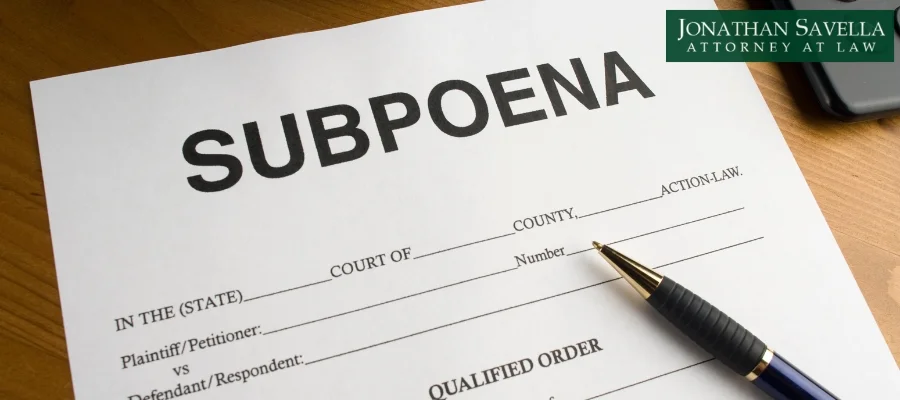Federal Grand Jury Subpoena Lawyer
Federal Grand Jury Subpoena Attorney
Federal grand jury subpoenas are one of the principal investigative tools at the disposal of federal prosecutors. Subpoenas rules dictate how these subpoenas must be issued, served, and complied with, ensuring due process and legal protections.
If you are under investigation or have received a subpoena, it’s crucial to consult with an experienced NYC federal grand jury subpoena lawyer who can guide you through the process and protect your rights. The following guide explains the purpose of grand juries and the role that grand jury subpoenas play in federal investigations.

What is a grand jury?
A grand jury investigates crimes and initiates criminal proceedings. In the federal system, a grand jury consists of at least 16 residents of the federal judicial district in which it sits.
What does a grand jury do?
Grand juries have two main functions: (1) investigating crimes and (2) determining whether or not to indict. As a practical matter, prosecutors present to the grand jury evidence (e.g. witness testimony and documents) that the investigatory “target” has committed a crime.
When the prosecutors have finished their presentation, the grand jury decides whether the evidence established probable cause to believe that the target committed the crime in question. If the grand jury determines that probable cause exists, it issues a “true bill” of indictment charging the target with the crime.
What is a grand jury subpoena?
A subpoena is a written order that compels an individual (or entity) to provide testimony or documents to the issuing authority. Grand jury subpoenas are issued to the individuals (or entities) believed by prosecutors to be in possession of information relevant to the grand jury’s investigation.
A grand jury investigating a financial crime, for instance, may use a subpoena to obtain statements and account information from the target’s bank. The same grand jury may also issue subpoenas requiring the target’s business partners and associates to appear and provide testimony regarding the target’s dealings.
What should I do if I receive – or believe I am going to receive – a grand jury subpoena?
The answer to this question depends on your relationship to the person or crime that is under investigation. In New York, if you are the crime victim or a witness to the crime, a grand jury subpoena may be no more than an invitation to formalize (through sworn testimony) an account that you have already provided to law enforcement officers. Complying with the subpoena under these circumstances should be a straight forward task.
When compliance with a grand jury subpoena is anything less than straight forward, you should proceed with extreme caution. Federal law makes it a crime to intentionally mislead – or attempt to mislead – a federal investigator.
For this reason, you should ask yourself whether you have any reservations about providing the testimony or documents that the subpoena demands. If the answer to this question is “yes,” you would be wise to retain defense counsel to evaluate your position and act on your behalf.
Mistakes To Avoid
Receiving a grand jury subpoena can be very intimidating. The most important thing to remember is that you don’t have to face this alone. Your first step should be to consult with an experienced attorney. Not engaging an attorney is a huge mistake some people make in this situation. Avoid making any statements before you speak with a lawyer.
Additionally, you should avoid destroying any documentation. This can raise suspicion and put your character into question. Another mistake to avoid is speaking with a prosecutor directly without a lawyer present. Remember, you have the right to legal representation, and it would be wise to use it.
Different Types of Subpoenas
You could be issued different types of subpoenas, and it’s helpful to understand the differences and how they could apply to you.
- Witness subpoena. This type of subpoena requires a witness to appear before the court. This subpoena is often used in criminal court cases.
- Subpoena duces tecum. This type of subpoena can be used when the office seeking the subpoena wants testimony from the witness and specific records, documentation, or tangible evidence. This subpoena can be valuable in civil cases, or any time documentation is needed to substantiate legal claims or defenses. The recipient of this subpoena must present the requested documents along with their testimony before the jury.
- Subpoena for disposition. This kind of subpoena can be used to summon a witness outside the hearing or trial setting. This usually happens in a designated location, such as an attorney’s office. This subpoena can be used to gather information and evidence before the trial. These subpoenas are common in sex crime cases where individuals may initially be afraid to appear before the court.
- Subpoena for medical records. This subpoena is common in personal injury or medical malpractice cases. This subpoena requests an individual’s medical records and medical history, which can be necessary to assess damages.
How a Lawyer Can Help Me in NYC
Receiving a grand jury subpoena can be an intimidating thing to experience. If you have been issued a grand jury subpoena, an attorney can help you in several ways.
- Understanding and protecting your legal rights. A lawyer can help you fully understand your legal rights. For example, you have the option to invoke your Fifth Amendment right against self-incrimination.
- Understanding the details of the subpoena. A lawyer can help you understand the reasoning for the subpoena and the potential consequences of testifying before the grand jury.
- Preparing your testimony. A lawyer can be a great asset in helping you prepare your testimony. You will almost certainly face some challenging questions and need to answer them effectively and without incriminating yourself. Jury investigations in federal crime cases can be intimidating, and it’s critical that you get a legal professional on your side to help you.
- Strategic legal advice. A lawyer can offer quality strategic legal advice based on their understanding and interpretation of the law.
- Documentation preparation. A lawyer can also help you avoid any mistakes in documentation. You want to avoid producing any self-incriminating records or documentation.
- Challenging the subpoena. If you believe the subpoena was wrongfully served to you, you could discuss it with your attorney. If so, an attorney can help you challenge the subpoena by filing a motion to quash it, declare it null and void, or at least limit its scope.
FAQs
How Do You Respond to a Subpoena In NYC?
There are three main ways to respond to a grand jury subpoena. One way is to comply, which is what most people elect to do. Grand jury subpoenas are mandatory, so compiling with them is often the easiest route to take. The second option is to challenge the subpoena if you believe you can make a strong case against it. The third option is to ignore the subpoena. This option could cause you to be held in contempt of the court.
Are Federal Grand Jury Subpoenas Secret In New York?
Yes, federal grand jury subpoenas in New York are secret. The proceedings are confidential by law. The subpoenas are served in secret, and only the grand jurors, court reports, the prosecutor, and any witnesses who are subpoenaed are allowed to attend the proceedings.
People are also prohibited from disclosing what happens in the grand jury hearing. The reason for the secrecy is to encourage witnesses and everyone involved to disclose as much information as possible without fear of retaliation or punishment.
Can an Attorney Issue a Subpoena in New York?
A licensed attorney can issue a subpoena in New York. A defendant in a criminal court case could be issued a subpoena by an attorney to appear in court. However, an attorney cannot issue a subpoena duces tecum to a state department or agency. Other entities that can issue subpoenas in New York include a commissioner, an administrative law judge, or a criminal court. A copy must also be served to the party on the opposing side of the case.
What Is the Difference Between a Grand Jury Subpoena and a Regular Subpoena?
One of the biggest differences between a grand jury subpoena and a regular subpoena is that a grand jury subpoena is served in secrecy. A standard trial subpoena may be made public. Grand jury subpoenas are often issued by federal prosecutors in criminal cases. Another major difference between a grand jury subpoena and a regular subpoena is that recipients cannot refuse to comply.
If you’ve served a grand jury subpoena, you should consult with an experienced lawyer promptly.
Do You Need a Lawyer if You’re Issued a Grand Jury Subpoena In New York?
It is strongly recommended to engage a lawyer in New York if you’ve been issued a grand jury subpoena. Before you testify before the court, it could be beneficial to consult with an experienced lawyer. A lawyer can help you prepare and fully understand your legal rights. Everything you say before government officials in a grand jury could go on record, and you could be held accountable. It’s wise to be fully prepared by speaking with a lawyer before you appear before the jury.
The Law Office of Jonathan Savella represents individuals and businesses who have received grand jury subpoenas. If you’ve received a grand jury subpoena, Jonathan will work with you to craft a response that protects your legal and personal interests.
Get in Touch With Our Federal Grand Jury Subpoena Lawyer
Facing a federal grand jury subpoena can be overwhelming, but you don’t have to navigate it alone. Our skilled Federal Grand Jury Subpoena Lawyers are here to provide the necessary guidance and protect your legal rights. Reach out to us today for trusted advice and personalized representation.




